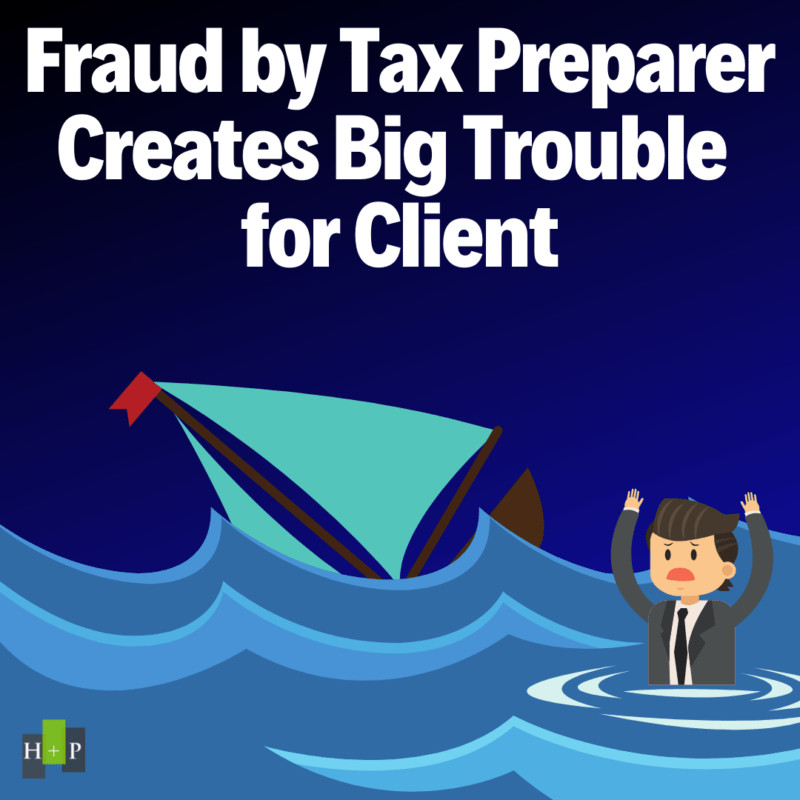Is your tax preparer honest? We sure hope so! You likely see indicators one way or the other. If your tax preparer commits fraud that benefits you, that can create trouble for you. Let’s see how this works in real life.
Situation
The government indicted, tried, and convicted tax preparer Gregory D. Goosby of 30 fraud violations where he willfully aided and assisted in the preparation of false and fraudulent income tax returns. Vincent Allen engaged Goosby to prepare his tax returns before Goosby’s fraud conviction. Allen gave Goosby his W-2, 401(k) statement, mortgage interest statement, and property tax statements. Goosby used those deductions but also added others, claiming false and fraudulent deductions for charitable contributions, meals and entertainment, and pager and computer expenses.
Guys with Guns
Two special agents from the IRS’s Criminal Investigation Division interviewed Allen concerning Goosby’s preparation of his income tax returns. Allen agreed with the IRS that the deductions were false and fraudulent, but both the IRS and Allen blamed Goosby. The IRS did not charge Allen with intent to evade taxes (fraud).
Statute of Limitations In general, the IRS has three years from the date you file your tax return to audit it and propose adjustments. In the case of fraud, the IRS can audit your return at any time. There is no limit on how far back the IRS can go.
In this case against Allen, the first-ever case of this nature decided by the Tax Court, the fraud was committed by Goosby, the preparer, not by Allen, the taxpayer. So the Tax Court had to decide whether the fraud by the tax preparer extended the statute of limitations on the client’s return.
And that’s exactly what the Tax Court decided in this precedent-setting case. The tax preparer’s fraud extends the statute of limitations for fraud to the client even when the client is not charged with fraud.
This means that if your tax preparer fraudulently prepares your return and you file it, the law extends the period during which the IRS can audit that tax return from the usual three years to forever.
Allen Was Lucky
Although Allen may not have felt lucky after he paid his lawyer fees and also handed over $10,000 in taxes, the IRS did not charge him with fraud and the court did not make him pay the 75 percent fraud penalty on the taxes due.
Beware
Using a dishonest tax preparer is a mistake. When the IRS catches the dishonest preparer, it likely catches you, too. And as the Tax Court has now ruled, fraud is a fraud, and that opens your tax return up to IRS examination forever.
You Are Responsible
- The Tax Court cited five tax law principles that apply to you and all your fellow taxpayers:
- You are charged with knowledge, awareness, and responsibility for your tax returns.
- You, not your preparer, have the ultimate responsibility to file a proper return and pay the proper tax due.
- You have the obligation to review your tax return for items that are obviously false or incorrect.
- If your tax preparer fraudulently prepares your tax return, you do not escape your obligation to pay the proper tax.
- If your tax preparer fraudulently prepares your tax return, your tax return is subject to audit forever (there is no statute of limitations for fraud).
Takeaway
Owning a dental practice means having someone who understands the tax code as it specifically relates to you. It’s common for general CPAs to travel the path of least resistance with their business clientele versus navigating the laws and providing adequate planning to your maximum benefit.
You can chat with a Dental Financial Expert today on our home page at Engage Advisors. We are here 24/7!

